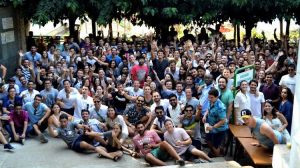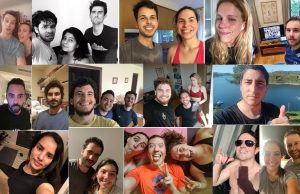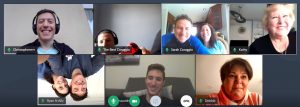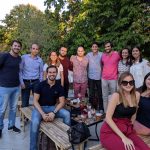Over the past few months, a group of IESE MBA Class of 2021 students led a research study named “Project COVID Mirror” that sought to understand the impacts of COVID on the IESE Class of 2021, as well as their reflections around how they coped with the quarantine, what they learned and what they hope for the future. The research team consists of Chris Coraggio, Antonio Niemeyer, Marilyn Heymann and Silvia Wu. They had 133 survey respondents, and conducted follow-up interviews with 32 of those respondents between April 15-28th (in the middle of the quarantine). This blog post is a summary of one of the articles in this series, co-authored by Chris Coraggio & Silvia Wu.
The day that Spain announced ‘Phase 0’ of the lockdown, we IESE MBA students were jumping up and down, as we finally had freedom to go *outside*! For us, the post-quarantine period has injected happiness and a deep appreciation for the everyday little things. Even with the quarantine behind us (crossing fingers!), we learned incredibly valuable lessons, which were sprinkled in the surveys and interviews. One memorable reflection was, “Something that I am learning a lot and surprises me is the amount of time and money I was expending on things that I do not value…”
We hope the lessons learned like this one by the IESE MBA Class of ‘21 are useful ones, and that it inspires reflection in our readers. Many thanks to our colleagues for sharing your candid reflections!

Looking back to a Class of 2021 photo taken in September 2019 – can’t wait to see everyone on campus soon!
Lesson 1: Dealing with your FOMO!
FOMO (fear of miss out) is just a fact of MBA life, particularly in the first year. FOMO in the MBA stems from a bunch of places all in one – the fact that the MBA experience is a short, one-time experience; our nature of comparing ourselves against our colleagues; and our insecurity of whether we’re on the right path – in other words – “Am I missing out on something that I might want to do?” It’s perfectly natural at a time when we are still asking ourselves what career and life we want for the rest of our lives. No pressure!
Suddenly and instantaneously, the lockdown put us in a vacuum, quieting the MBA noise and rush of the buzzing campus life. In our homes, we had no choice of where to go and few options for what to do – but we knew our colleagues were in the same boat. In some ways, that was a good thing – we lost the fear of what we might be missing. In our survey, many of our classmates mentioned that not having FOMO was a real positive part of the quarantine: “I have reduced social anxiety [due to] near-total absence of FOMO.”
In the vacuum of full-lockdown, we also had more brain space to think about one of life’s most important questions: “what matters to me?”. One interviewee said, “This period at least helped me think about what I am doing, what are my plans, what do I want from this experience, from my life in general.” Another classmate said: “Positively it’s slowed things down so much – journaling, considering so many different things – what I eat, how I drink, who I spend my time with, resetting.” Let’s break that down further. We think the sources of FOMO are (1) comparing ourselves to our peers and (2) being uncertain about whether we are making the right choices with their time.
If that’s the case, a few techniques to work against this would be:
- Take more consistent time to individually reflect. Go somewhere quiet alone. Ask yourself: are you clear about what you want? Are you on the right path?
- Speak to people. Know what you want based not on your own theoretical understanding of something, but on other people’s real experiences before you and your own experience (cue the next bullet).
- Choose experiences that will help you figure out what you want if you’re not sure.
- Choose your priorities consciously – literally as a list. What is really most important to you? If you find these changing rapidly, think about why that’s the case.
- Keep telling yourself your priorities, so you don’t feel bad about missing out.
This part of your MBA experience is a huge source of growth – and will be invaluable when we are searching for full-time jobs that will inevitably force us to make hard choices about our future life – Is it the right company? Right role? Right career path? Right location? Is this the life I really want now and in the future? It’s not easy, but you have to know what you want.
Lesson 2: Taking Care of our Mental Health
Mental health is a rampant issue in the business world – the European Mental Health Agenda of the European Union (EU) estimates that 20% of the adult working population has some type of mental health problem at any given time. They also say, “In the United Kingdom, 80 million days are lost every year due to mental illnesses, costing employers £1-2 billion each year.” Unfortunately, mental health is an issue we often don’t acknowledge, including in the MBA. Intense workloads, job searching, interview preparation and even FOMO, like we mentioned earlier, cause or exacerbate issues.
On top of the “MBA normal”, the pandemic and ensuing lockdown barrelled into our experience – so it isn’t surprising to see that 53% of survey respondents reported a decline in mental health and 79% a decline in happiness, according to our COVID survey. Without much of a choice, we pushed ourselves to adapt to our new normal: “it’s not been easy. But I did adjust to it fast..I learned to spend time with myself and I learned how to enjoy it.”
For many of us, we adapted as much as we could, but still felt our mental states slipping. There were two themes around mental health here – first, what were ways we could “be stronger” and help ourselves, and second – should we seek help?
Most people resorted to self-help, naming exercise as one of their main strategies: “Exercise has been the best thing for my mental health and my mood dramatically improves after”, with a good number also practicing meditation. Others took my friend Deeksha’s advice: “Find what gives you joy, and do that.” One interviewee said the same thing; “enjoy the little things, reading books, sitting in the sun room. Cherish the simple things.”

Insanity Workout Hour with IESE Buddies
For the majority of our class though, mental health in general was a new topic. Fortunately, a group from both class years stepped forward to organize the first Mental Health Awareness Day. Deeksha and Charlie shared their experience: “We saw a gap in discussion around mental health” and wanted to “change the mindsets and reduce stigma around mental health, clearly signpost existing resources around mental health (such as mobile apps and therapy sessions) and put on engaging events for students.” At the event, few participants admitted they had ever seen a therapist or counselor, and mostly relied on themselves or close confidants for advice. The event gave students a chance to share “how they are feeling in this current time” – “having an open forum to talk really helped.” We are excited to see future Mental Health initiatives!
Bottom line, here were our takeaways:
- Many of us appreciated the message that “it is OK to say ‘I’m not OK’’’, and get help as needed.
- Physical health is inextricably linked to mental health – you cannot have one without the other.
- Do what you can personally to keep yourself healthy and happy, and for everything you can’t control – get professional help.
- Find community around you. Many actually feel unmotivated to join or be active in a community, but that may be exactly what is needed to keep your spirits up.
Lesson 3: How we prioritize and connect with family
It wasn’t surprising to see in our COVID survey that 55% of classmates reported improvements in connections to family (35% said no change). The pandemic ‘triggered’ not only more contact with family, but deeper conversations that might not have happened typically under normal circumstances. Mundane updates turned into discussions on life and death, health and illness, responsibilities and relationships.
We also found more fun and interesting ways to connect with our families. One student shared, “I made a virtual group call with my entire family (about 20 people) for my grandmother’s birthday. She was turning 90 years old and the entire family got together using zoom. Most of my family lives in Peru, but we all share the same frustration of not being able to visit her on this special occasion.” Another said, “my family learned to play Jackbox TV games online together”.

Family Zoom Reunion of Chris Coraggio, IESE MBA 21
Another topic is a bit heavy: many of us are or were worried about our elder family members. One student reflected: “it takes me back to the point of people realizing the fragility of life. Life is fragile and finite.” For many of us, with this realization, we deepened our sense of empathy and responsibility, along with paying attention to the wellbeing of others.
As we return to a new normal, it’s likely we will return to a life busier with exploring the city and going to in-person events (sounds novel, right?). Our conversations will center less around safety and return to the normal updates. But we hope these calls remain different – on video, more frequent, and deeper conversations about topics that matter. After all – “The pandemic really made us realize that we can’t take for granted that we know what the future will look like. We have to value the people in our lives as if anything can happen to us or them at anytime”. Our families are the most important ingredient to a joyful life, so let’s treat them that way.
Lesson 4: The Value of our Network
With COVID like a dark cloud over the economy, the internship and full-time job markets seem bleak for many industries. Many of our colleagues had their internship offers rescinded or projects delayed for months. What became crystal clear was that our network, individually and collectively, was the only way to weather the COVID storm. It served as a web of knowledge, experience, connections and support that we relied on (and contributing to) to not only land our jobs, but thrive in them and prepare for an uncertain future.
Thankfully, the IESE alumni community and other partners showed up for us. Many alumni shared their experiences from the last financial crisis, offered individual coaching and even offered us internship opportunities to support us. Many students also shared that they found internship opportunities through their colleagues and own networks, and new opportunities that colleagues and the MBA Career Services found, like MBAs Fight COVID, were opportunities for us to gain experience while making a difference.
Networking was always something many were uncomfortable with, the twist was now having to do everything online – including the networking conversations themselves. In a way, that was good because it leveled the playing field in terms of location. Some people had more time to chat than before because of quarantine. On the other hand, many of us MBAs needed to get over our discomfort with online networking with someone we haven’t met before. And further, it doesn’t make it easier that we endured 8-10 hours of Zoom calls every day – avoiding another call was easy to forgive.
As the campus and Barcelona continue to open up, our opportunities for in-person networking will increase. It will be important to remember that whether in quarantine or not, our network is still the most important element of our success long-term and needs to be cultivated intentionally over time, even online. More Zoom meetings!
Conclusion
With our lives slowly adjusting to (a new) normal in Spain, we realize the pandemic is still far from over worldwide, the economic outlook is hazy and we expect long-lasting changes to how society functions. The struggle continues, but now we don’t take for granted little things, like sitting down inside a restaurant, walking outside or dancing in a club.
Winston Churchill once said, “Never let a good crisis go to waste.” We can confidently say our classmates and us even in writing this article have learned a lot being in quarantine. Tackle your FOMO, attend to your mental health, find the best way to stay connected with family, and keep building your network, even if it’s all online.
This is our chance to build a better life for ourselves and for society. Let’s get to work!
We hope you found this article insightful, you can find the full length version here. For more information on this study or requests for interviews, please contact Chris Coraggio (christopher.coraggio@iese.net). If you are interested in reading other articles in this series, take a look at the impacts of COVID on Latin American students and a summary of the data.
Pursue your dream MBA! Take these next steps today:






